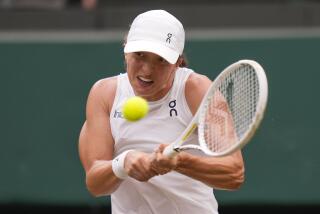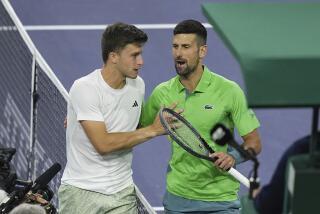Edberg Makes an Early Exit : U.S. Open: Defending champion is eliminated by 18th-ranked Novacek.
- Share via
NEW YORK — Stefan Edberg barely glanced up at the final lob. He couldn’t reach it and he couldn’t race back for it. And with that lob, he knew, the defense of his two consecutive U.S. Open titles was over.
Edberg danced on the tightrope until he finally fell off, going down hard Thursday in the second round. He teetered precariously in the first round, surviving a five-setter just as he did three times before winning the title a year ago. He tried to do it again after losing the first two sets against 18th-ranked Karel Novacek, but this time Edberg fell, 7-6 (7-3), 6-4, 4-6, 6-4.
Edberg’s loss marked only the third time in the Open era that a defending champion has lost as early as the second round. Mats Wilander in 1989 and Ilie Nastase in 1973 were the two other champs to suffer such a quick exit.
“It was one of those days,” Edberg said. “He played a solid, good match. I was struggling with my timing. I couldn’t generate any power for some reason. I was pushing the ball instead of hitting it.
“It’s sad. I’ve been playing pretty well and I had a reasonable draw. You can’t bring it back. I did what I could. I felt I was fighting back, and within five minutes the match was over.”
Edberg, indeed, seemed on the verge of coming back in the fourth set. He hit a leaping overhead backhand to hold serve and tie the set at 4-4. But Novacek, who out-aced Edberg 14-1, held with a clever combination of attack and baseline tennis.
When Edberg served to stay in the match, trailing 5-4, Novacek pounced on his first two serves to return brutal winners. Novacek made it 0-40 with another backhand return that Edberg netted. And after saving two match points, Edberg just watched in despair as a beautiful backhand lob by Novacek drifted over his head and safely inside the baseline.
Edberg’s coach, Tony Pickard, watched in amazement at the chances Novacek took on returns of Edberg’s serves.
“Novacek was just teeing off at everything,” Pickard said. “They could play that match tomorrow and most of his winners would hit the backstop. In the first round, Olivier Delaitre did the same thing. More and more guys are coming out and teeing off like this. On the days they all go in, there’s not much you can do about it. But still, honestly, I thought Stefan could get out of it.”
Edberg, a Swede who lives in London, has never enjoyed playing in hot, humid weather. It bothered him in the first round when he nearly lost. It wasn’t hot Thursday, but the clammy, heavy air wore him down.
“I played well in patches,” said Edberg, the sixth men’s seed to lose, the other five in the first round. “But I was seeing the ball a little late. I hesitated on a lot of occasions. There’s always pressure when you’ve won here before. You look forward to performing as good as last year.”
Novacek was deservedly proud of the biggest victory of his life.
“I showed the U.S. public I can play some good tennis,” he said.
The Edberg-Novacek drama was played out on the grandstand court at the same time No. 4 Boris Becker, the 1989 Open champion, labored on the stadium court against Andrei Cherkasov. Rain interrupted that match moments after Edberg’s loss, with Cherkasov leading 6-3, 7-6 (10-8), 5-7.
Earlier, Pete Sampras struggled, too, before winning. Sampras fiddled with his racket strings. He stared at his shoes. Two dozen aces whizzed past him and his stoic expression never changed.
He didn’t notice Sophia Loren right behind him, cheering “mah-velous” when he slapped back some of those serves for winners. He showed not a trace of excitement when he hit 17 aces of his own or closed out a difficult 6-4, 5-7, 6-2, 7-6 (7-3) victory Thursday over Daniel Vacek to reach the third round of the U.S. Open.
Sampras is no Andre Agassi, no John McEnroe, no Jimmy Connors. And if folks find Sampras boring, he makes no apologies. He wins in his own poker-faced way.
“Andre has so many outside distractions, where I really don’t,” Sampras said. “Everywhere he goes, he is mobbed. Maybe he causes that kind of aura. Maybe he likes it.
“I am not trying to be much of a hot dog out there. Just go out there and get the job done. That is the attitude I have. That is the attitude (Jim) Courier has. That is the attitude that a lot of the top players have.”
Vacek was the one slamming the court with his racket at the end, a frantic loser’s look on his face at mistakes and missed chances. A double-fault gave Sampras match point in the tiebreaker, a forehand long ended it.
Until that moment, though, Sampras didn’t know which way the match would go. Vacek, at 22 the same age as Sampras, didn’t turn pro until 1990, the year Sampras became the youngest U.S. Open winner. Since then, Sampras won Wimbledon and reached No. 1 for a while before slipping to No. 2. Vacek, a tall, skinny Czech with a bony face, is No. 99 and has not gotten past the second round in his five Grand Slam appearances.
Yet, Vacek aced Sampras 16 times in the first two sets and effectively chipped and charged when receiving. But his unforced errors from the baseline mounted, 43 to Sampras’ 16, and that was too much of a burden.
“He was a very dangerous player,” Sampras said. “The guy served huge. I was having a hard time reading his serve. And even if you miss his first serve, his second serve was really kicking.”
More to Read
Go beyond the scoreboard
Get the latest on L.A.'s teams in the daily Sports Report newsletter.
You may occasionally receive promotional content from the Los Angeles Times.










